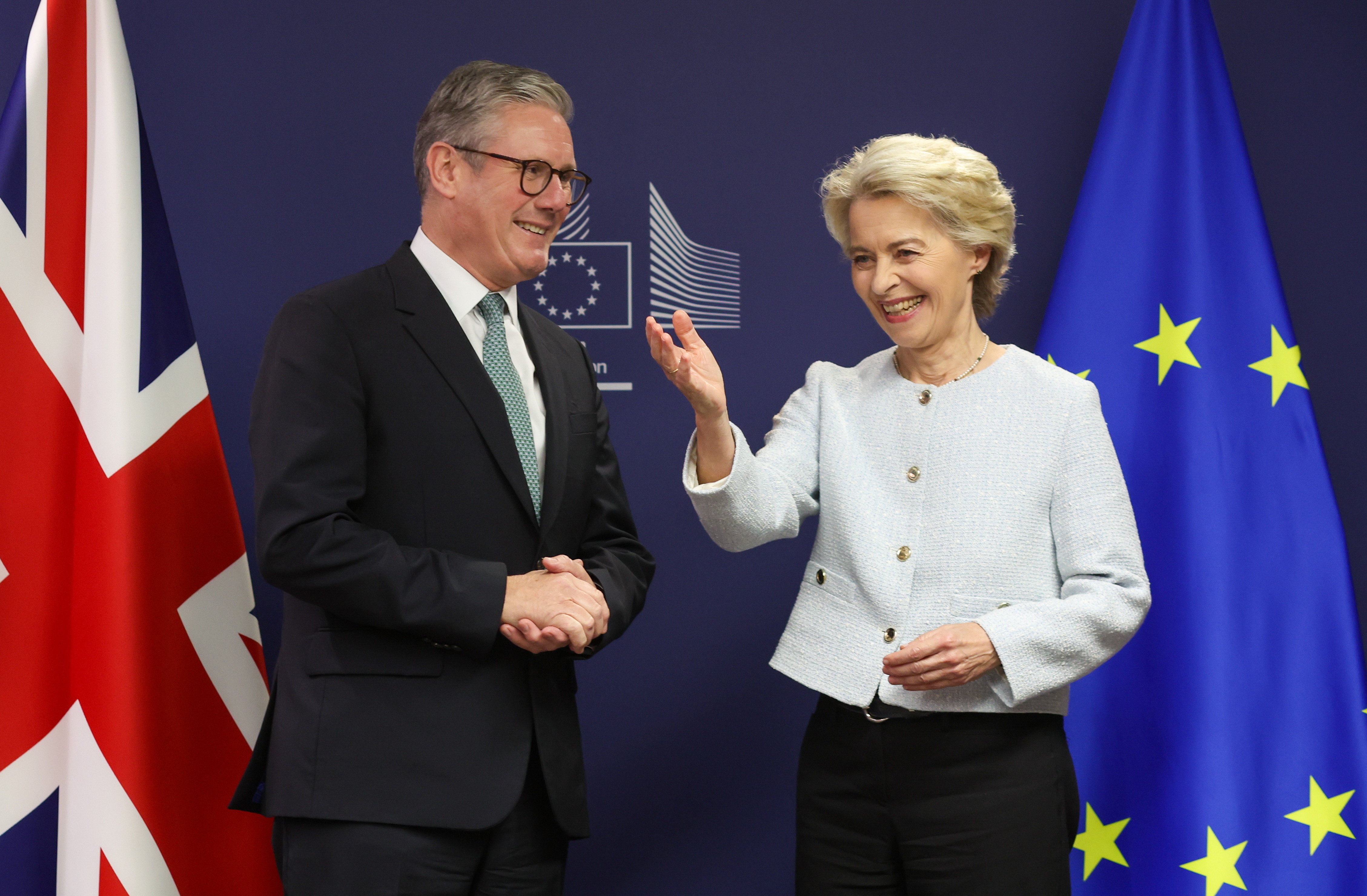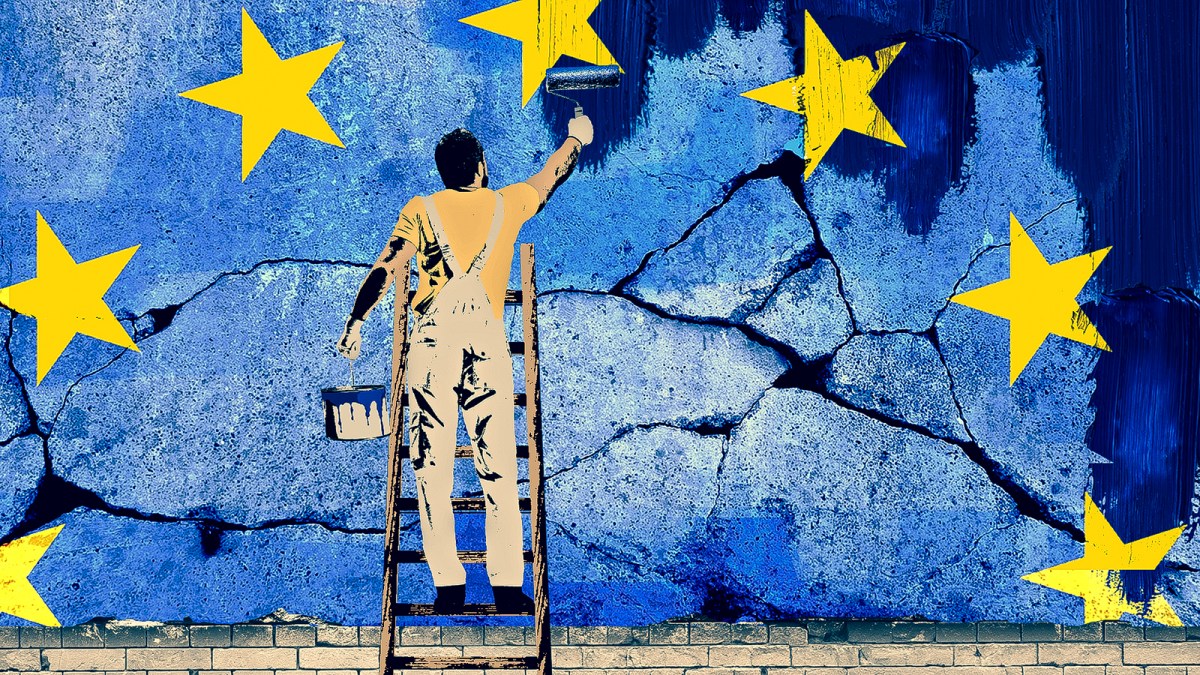Less than a third of Britons would vote to leave the European Union if the Brexit referendum were repeated, according to a poll.
An exclusive survey for The Sunday Times found that 29 per cent of people would vote to leave the EU, compared with 52 per cent at the time of the referendum in June 2016.
The tables have turned, according to the poll by the think tank More in Common, which found that this figure, 52 per cent, was now the percentage that would vote to remain.
Almost half of respondents, 49 per cent, thought there should be a referendum on rejoining the EU in the next five years, including many who voted to leave but would now vote to remain. More than a third, 37 per cent, were opposed to another vote, the poll revealed.
The survey of 2,113 people conducted between July 22 and 24 showed a major shift in public sentiment towards the EU, with support for Remain increasing by four percentage points in just over a year.
The figures come as the Labour government pursues a closer relationship with Europe. In May Sir Keir Starmer agreed a deal with Brussels which included e-gate access for British passport holders in Europe, no health certificates every time pets travel to the jurisdiction and the removal of red tape from most food and drink imports and exports.

According to the poll, the only groups where a majority would still vote to leave the EU were people who voted Conservative at the past general election, 52 per cent, and Reform voters, 68 per cent.
Nigel Farage has said the first thing he would do as prime minister if his party won an election would be to remove Britain from the European Convention on Human Rights (ECHR) but the poll suggested this idea was not hugely popular.
Some 58 per cent believed Britain should remain a member of the convention, an increase in support of eight points since June, when Kemi Badenoch, the Conservative leader, started a review of Britain’s membership of the treaty.
The ECHR was a dividing issue in last year’s Conservative leadership election, with Badenoch’s rival Robert Jenrick championing the idea that Britain should pull out. Critics of the treaty wanted to leave it because they believed it had been used to frustrate attempts to deport migrants from Britain.
According to the poll, 28 per cent wanted Britain to leave the ECHR, though support for an exit had fallen two points since June. Support for leaving the treaty was highest among people who voted for Reform last year, 68 per cent, with those concerned about crime, 41 per cent, asylum, 64 per cent, and migration, 55 per cent, also more likely to support leaving.
The poll showed the only world leader who was viewed largely positively by the British public was the President Zelensky of Ukraine, with a net approval of 39 per cent. The other world leaders who are viewed positively overall included the French president, Emmanuel Macron, with 14 per cent, and the European Commission president, Ursula Von der Leyen, with 10 per cent.
Vladimir Putin was the most unpopular world leader, at minus 64 per cent approval, followed by Binyamin Netanyahu (minus 37), Donald Trump, (minus 35), while President Xi of China was among the least unpopular, at minus 24 per cent.

President Xi is unpopular in Britain but outpolls President Putin by forty points
SERGEY BOBYLEV/EPA
Public opinion was evenly split between those who thought Starmer had been too friendly to Trump and those who thought he had struck the right balance, both 38 per cent. Just 5 per cent felt Starmer had stood up to Trump too much.
Confidence in the Nato partnership was falling. Some 49 per cent thought it was more likely than not that the US would defend another Nato member if they were attacked, while 5 per cent thought this was certain to happen.
Turning to the threat posed by China, 43 per cent of Britons thought it was likely the superpower would attempt to invade Taiwan in the next five years. In the event, 44 per cent believed Britain should assist with diplomatic efforts to support Taiwan and negotiate a ceasefire, while 40 per cent thought we should offer humanitarian aid. Just 21 per cent supported giving military aid.
The poll’s findings came days after John Healey, the defence secretary, said Britain was ready to fight in the Pacific if conflict broke out over Taiwan. The Chinese president had not ruled out the use of force in the “reunification of the motherland”. Beijing maintained it had sovereignty over Taiwan, which the government in Taipei firmly rejected.
The Labour government was simultaneously pursuing closer ties with Beijing, with Starmer expected to visit the Chinese capital later this year. However, 56 per cent of Britons oppose Chinese investment in UK transport and energy infrastructure, compared with 32 per cent in favour, and more opposed Chinese investment in public services, 60 per cent, compared with 29 per cent in support.
However, the poll showed they were divided over support for a Chinese super-embassy in London, with 41 per cent opposed compared with 38 per cent in favour.
In better news for Anglo-Sino relations, voters were more relaxed about Chinese investment in British high street retail, with 44 per cent in support compared with 43 per cent opposed. During negotiations, 44 per cent believed the British government should have spoken more about human rights abuses in China, with 26 per cent saying the government spoke about them the right amount.
Luke Tryl, director of More in Common, said: “With fewer than three in ten saying they would vote to leave the EU in a referendum today and almost six in ten saying the UK should remain in the ECHR, the days of Europe as a political bogeyman may be on the wane and politicians might find themselves pushed on how they’ll build a more constructive relationship with Europe. That’s especially true in the face of an erratic Trump presidency, with Brits split as to whether Starmer is being too friendly to the US president or not.
Last week a previous poll showed that a half of Britons believed we should keep up support for Ukraine until the territory lost from the start of the war with Russia was won back, while a third believed China was a threat.
“Meanwhile, Although Brits support for Ukraine remains strong they are more nervous about involving the UK in a conflict in Taiwan. Even though more than four in ten think it likely China will invade Taiwan just one in five would support giving military aid.”
